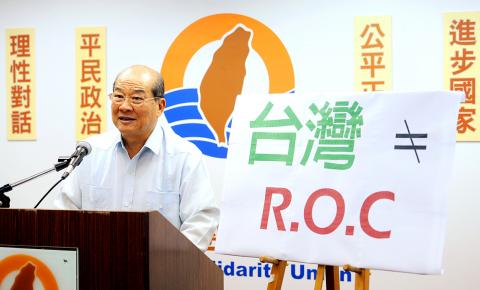Academics and politicians continued to express mixed reactions yesterday to Democratic Progressive Party (DPP) Chairperson Tsai Ing-wen’s (蔡英文) “recognition” of the Republic of China (ROC) last weekend, with some members of the pan-green camp voicing strong disapproval.
While most people, including the DPP’s rival in the January presidential elections the Chinese Nationalist Party (KMT), welcomed the statement, some DPP members expressed displeasure over Tsai’s statement, with DPP Legislator Twu Shiing-jer (涂醒哲) saying that Taiwan is not the ROC and that its status remains undecided.
Tsai, the DPP’s presidential candidate, repeated her call for members of the pan-green camp to support her willingness to recognize the ROC on Monday night in a campaign stop in Chiayi City.

Photo: Lo Pei-der, Taipei Times
Taiwanese were able to “absorb the ROC in” 60 years, she said, so that the KMT should be more closely identified with Taiwan by now.
She also said that Taiwan was more than a geographical term or a “homeland,” as President Ma Ying-jeou (馬英九) said in his national day speech on Monday, but a place with a “meaning of sovereignty.”
Media quoted analysts as saying that Tsai’s statement was “not surprising” and was in line with the DPP’s resolution on Taiwan’s future in 1999, which stated that Taiwan is an independent and sovereign country currently using the name ROC.
Tsai’s interpretation of the ROC differs from Ma’s, which still defines the ROC as the country -established by Sun Yat-sen (孫逸仙) in 1912 and which consists of 35 provinces, including modern-day Mongolia, former Mainland Affairs Council chairman Joseph Wu (吳釗燮) told a forum organized by the Taiwan Brain Trust.
The ROC that Tsai recognized is a country with the territories of Taiwan, Penghu, Kinmen and Matsu, a country that remade itself after being expelled from the UN in 1971, Wu said.
Most Taiwanese would be able to relate to Tsai’s interpretation of the ROC better than that of Ma’s, which holds the view that the ROC — and only the ROC — holds sovereignty and Taiwan is and has always been only part of the ROC, he said.
Meanwhile, the Taiwan Solidarity Union (TSU), a DPP ally, expressed its disagreement with Tsai, saying that “Taiwan is not the ROC and the ROC is not Taiwan.”
“Taiwan is Taiwan. It is a de facto independent country. The TSU always maintains that what Taiwan really needs is name rectification and a new constitution,” TSU Chairman Huang Kun-huei (黃昆輝) told reporters at a separate press conference.
Taiwan was not an ROC territory when the ROC was founded in 1912, nor did Taiwan send representatives to the ROC Constitutional meeting in 1936, which was why former president and TSU spiritual leader Lee Teng-hui (李登輝) characterized it as “the ROC in Taiwan,” Huang said.
Lee referred to the current situation as “the ROC in Taiwan” because dictator Chiang Kai-shek (蔣介石) and his KMT troops brought “the ROC system” to Taiwan after their defeat in the Chinese Civil War in 1949 without first securing the consent of Taiwanese, Huang said.

Seventy percent of middle and elementary schools now conduct English classes entirely in English, the Ministry of Education said, as it encourages schools nationwide to adopt this practice Minister of Education (MOE) Cheng Ying-yao (鄭英耀) is scheduled to present a report on the government’s bilingual education policy to the Legislative Yuan’s Education and Culture Committee today. The report would outline strategies aimed at expanding access to education, reducing regional disparities and improving talent cultivation. Implementation of bilingual education policies has varied across local governments, occasionally drawing public criticism. For example, some schools have required teachers of non-English subjects to pass English proficiency

‘FORM OF PROTEST’: The German Institute Taipei said it was ‘shocked’ to see Nazi symbolism used in connection with political aims as it condemned the incident Sung Chien-liang (宋建樑), who led efforts to recall Democratic Progressive Party (DPP) Legislator Lee Kun-cheng (李坤城), was released on bail of NT$80,000 yesterday amid an outcry over a Nazi armband he wore to questioning the night before. Sung arrived at the New Taipei City District Prosecutors’ Office for questioning in a recall petition forgery case on Tuesday night wearing a red armband bearing a swastika, carrying a copy of Adolf Hitler’s Mein Kampf and giving a Nazi salute. Sung left the building at 1:15am without the armband and apparently covering the book with a coat. This is a serious international scandal and Chinese

TRADE: The premier pledged safeguards on ‘Made in Taiwan’ labeling, anti-dumping measures and stricter export controls to strengthen its position in trade talks Products labeled “made in Taiwan” must be genuinely made in Taiwan, Premier Cho Jung-tai (卓榮泰) said yesterday, vowing to enforce strict safeguards against “origin laundering” and initiate anti-dumping investigations to prevent China dumping its products in Taiwan. Cho made the remarks in a discussion session with representatives from industries in Kaohsiung. In response to the US government’s recent announcement of “reciprocal” tariffs on its trading partners, President William Lai (賴清德) and Cho last week began a series of consultations with industry leaders nationwide to gather feedback and address concerns. Taiwanese and US officials held a videoconference on Friday evening to discuss the

PERSONAL DATA: The implicated KMT members allegedly compiled their petitions by copying names from party lists without the consent of the people concerned Judicial authorities searched six locations yesterday and questioned six people, including one elderly Chinese Nationalist Party (KMT) member and five KMT Youth League associates, about alleged signature forgery and fraud relating to their recall efforts against two Democratic Progressive Party (DPP) legislators. After launching a probe into alleged signature forgery and related fraud in the KMT’s recall effort, prosecutors received a number of complaints, including about one petition that had 1,748 signatures of voters whose family members said they had already passed away, and also voters who said they did not approve the use of their name, Taipei Deputy Chief Prosecutor